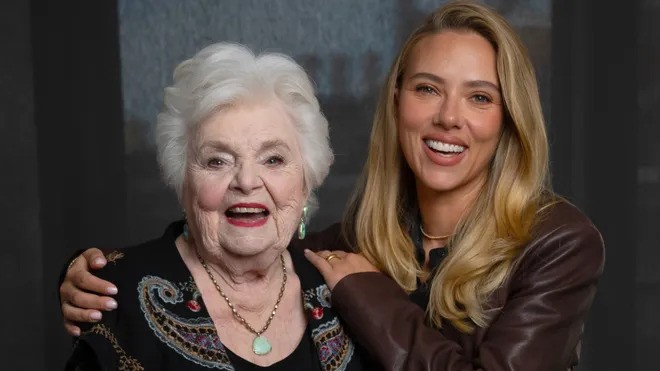Age is often described as just a number, but for June Squibb, that phrase isn’t a cliché—it’s a lived reality. At 95 years old, Squibb continues to defy expectations in Hollywood and on Broadway, balancing new projects, exploring fresh challenges, and embracing the stories that matter most to her. With the release of Eleanor the Great, the directorial debut of Scarlett Johansson, and an upcoming return to Broadway in Marjorie Prime alongside Cynthia Nixon, Squibb’s career is not just continuing—it’s flourishing.
This latest chapter for the Oscar-nominated actress underscores a career built on resilience, passion, and an unwavering commitment to her craft. For Squibb, there is no slowing down, no retirement plan, and no boundaries imposed by age. Instead, she seems to be entering one of her most prolific and inspiring eras yet.
It’s been over a decade since Squibb stunned audiences with her scene-stealing performance in Alexander Payne’s 2013 film Nebraska, where she played Kate Grant, the sharp-tongued wife of Bruce Dern’s aging dreamer. That role earned her an Academy Award nomination for Best Supporting Actress, putting her name on the global stage after decades of steady but often underappreciated work.
Since then, she has been unstoppable. Of her 102 film and television credits, more than half—54, to be exact—were earned in just the last ten years. It’s a remarkable testament to her enduring energy, versatility, and the demand for her presence on screen.
Squibb has appeared in comedies like Adam Sandler’s Halloween romp Hubie Halloween, lent her voice to Pixar’s Inside Out 2, and even popped up in Modern Family. Each role, whether small or expansive, carried that same Squibb magic—an unfiltered honesty and sly humor that audiences can’t resist.
Now, Squibb stars in Eleanor the Great, a heartfelt drama directed by Scarlett Johansson in her first feature behind the camera. The collaboration between the two women has drawn attention not only because of Johansson’s star power but because of the trust and mutual admiration between the veteran actress and the Hollywood A-lister.
In Eleanor the Great, Squibb plays a spunky, sharp-tongued character grappling with grief after the loss of her best friend. It’s a role that highlights the complexities of aging, loss, and resilience without resorting to stereotypes. Squibb herself has emphasized how rare it is to see such characters—older women with depth, humor, and agency—on screen.
“I don’t think you see women like Eleanor on screen all that often,” Squibb explained in an interview. “Having empathy for each other is important, because I don’t think we’re doing that enough now. But somebody might change by seeing this film—they truly might.”
Johansson, who has spent most of her career in front of the camera, found inspiration in working with Squibb. In interviews, she’s been quick to highlight Squibb’s spirit, talent, and sense of humor. At one point, when Squibb mentioned celebrating her 96th birthday with dinner at Joe Allen, a beloved New York theater district spot, Johansson teased: “And all of her money! A rager at Joe Allen!”
The chemistry between the two is clear—Johansson as a director finding her voice, and Squibb, the seasoned actress, bringing humanity and truth to every scene.
As if a new movie weren’t enough, Squibb is preparing for her return to Broadway later this year in Jordan Harrison’s Marjorie Prime. The play explores memory, mortality, and the role of artificial intelligence in grappling with human loss. Squibb will portray an ailing woman who spends her final days in conversation with a holographic version of her late husband.
The production begins previews at the Hayes Theater on November 20, just two weeks after Squibb celebrates her 96th birthday. The timing is fitting—a milestone birthday celebrated not with quiet retirement but with a demanding Broadway schedule.
“Being offered a Broadway show is pretty hard to turn down, period,” Squibb said. “I really just felt this is something I could do onstage. And even physically, (my character is) sitting in a chair talking the whole time. So I just felt yes, I can do this.”
Squibb has a long history with Broadway, dating back to her debut in 1960 as Electra in the original production of Gypsy. Over the years, she has returned to the stage in productions ranging from musicals to dramas, most recently appearing in Sara Bareilles’ Waitress in 2018. For her, the stage has always been a second home.

Even the practicalities of performing at her age are met with humor and pragmatism. On days with both matinee and evening performances, she plans to simply stay at the theater and order food in, rather than commuting back and forth. “Although back when I was doing The Happy Time in 1968,” she recalled with a grin, “my husband would meet me and I’d have one martini, and then go do the show.”
What makes Squibb’s current roles particularly powerful is how openly they deal with the subject of aging. In both Eleanor the Great and Marjorie Prime, the characters face the realities of grief, memory, and mortality. Yet these aren’t grim portraits—they are nuanced, layered stories about resilience, connection, and the humor that persists even in life’s hardest moments.
Hollywood has long struggled with how to portray older women. Too often, they are relegated to background roles, stripped of individuality, or presented only as burdens. Squibb, however, is rewriting that narrative. By embracing characters who are vibrant, flawed, witty, and real, she is offering audiences a new lens through which to understand aging.
It’s no coincidence that Squibb herself has become something of a symbol for longevity and creativity in the arts. She isn’t taking roles out of necessity—she’s choosing projects that challenge her and reflect her values. Whether it’s Scarlett Johansson’s intimate debut film or a cerebral Broadway drama, Squibb’s choices are deliberate statements about the stories worth telling.
Squibb’s longevity in the industry is remarkable, but it’s also the result of a deep love for storytelling. From her early days on Broadway to her breakout in Nebraska and her current renaissance, she has consistently gravitated toward stories that resonate on a human level.
Her sense of humor remains intact, her outlook grounded, and her dedication unwavering. While some actors might view their 90s as a time for reflection, Squibb is still firmly in the act of creation. She embraces each role as an opportunity—not just to perform but to connect with audiences.
“I’ve spent a lot of my life going to Joe Allen,” she said of her favorite New York restaurant. The comment reflects not just her personal tastes but her lifelong commitment to the theater community. Even now, when she talks about celebrating her birthday, it’s about gathering friends, enjoying good food, and staying close to the creative world that has defined her life.
For younger actors, particularly women in Hollywood, Squibb’s career offers a blueprint for longevity. She demonstrates that there’s no expiration date on creativity or relevance, and that meaningful work can come at any age.
Scarlett Johansson, at 40, has decades of experience behind her but still looks at Squibb with admiration. Their collaboration is symbolic of a broader shift in the industry: a recognition that stories about aging, memory, and resilience are as compelling as any blockbuster action film.
Squibb’s ability to mentor through example—by continuing to take on challenging projects, to command attention on stage, and to embrace new artistic partnerships—ensures her influence will be felt for years to come.
As Squibb heads toward her 96th birthday, her calendar is as full as ever. Eleanor the Great is now playing in theaters, introducing audiences to another unforgettable character in her repertoire. Marjorie Prime is preparing to open on Broadway, marking her long-awaited return to the stage. And beyond these projects, who knows what’s next?
One thing is certain: retirement isn’t on the horizon. Squibb remains deeply engaged with her work, curious about new stories, and committed to portraying women with honesty and vitality.
Her journey is proof that age doesn’t limit ambition. If anything, it sharpens it. For June Squibb, each role is another opportunity to leave her mark—not only as an actress but as a storyteller whose career spans generations and continues to evolve.

June Squibb’s story is a rare and inspiring one in Hollywood. At 95, she is not just surviving in the industry—she’s thriving, starring in films, returning to Broadway, and shaping the way we think about aging and creativity. Her performances remind audiences that life, no matter the stage, is filled with moments worth exploring, worth laughing about, and worth sharing.
As she prepares to celebrate her 96th birthday with a dinner at Joe Allen and launch into a demanding Broadway run, Squibb proves that the best chapters can still be ahead, even after a lifetime of achievement.
June Squibb isn’t just an actress in her 90s—she’s a force, a legend, and a beacon of what it means to live fully, tell stories bravely, and never let age define the scope of one’s dreams.










